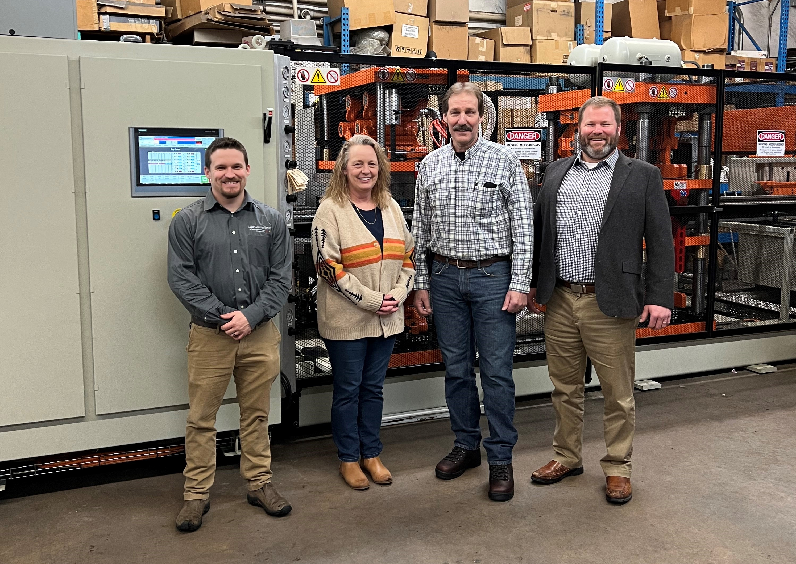Planning is critical for business succession

18 May 2023
GRE
Entrepreneurs often begin their business endeavors with a great idea to resolve gaps observed in their local economy. Despite their successful efforts, many do not plan — or want — to contemplate how their businesses end, whether to retire or move on to other business ideas. As the baby boom generation reaches retirement age in record numbers, more small business owners seek to exit their ventures. Therefore, the need for succession planning is more important than ever.
“It is never too early to start thinking about exiting from a business, whether that is for retirement or other reasons,” said Zack Filipovich, consultant and finance manager at Northspan Group. “We tell all of our entrepreneurs to start a business with the end in mind.”
Business succession planning determines whether a business owner is ready and able to pass control of an operation to another. But that process is often quite challenging. Many business owners avoid succession planning or developing an exit strategy. There is uncertainty about how capable a family member can continue the business or if estate planning will resolve the situation. Fear often plays a factor, from that uneasy feeling of quitting that has driven the entrepreneur throughout their career to what the community would think.
“Business succession planning is more than just financial planning,” said Katie Heppner, director of the North Central Region Small Business Development Center at Central Lakes College. “It is a layered, sensitive topic with much emotion tied to it that comes from years of operation in their communities.”
Business owner retirements are increasing
Recent studies indicate more than 50% of all business owners are individuals over the age of 50. The baby boom generation — born between 1946 and 1964 — owned over 2.3 million small businesses, employing 25 million people. Many of those business owners are looking to sell, with a recent survey indicating 45% of business owners are selling their business to retire.
Yet, many business owners may not have all the information necessary to retire successfully. In the 2016 U.S. Trust Insights on Wealth and Worth survey, approximately two-thirds of respondents did not have an exit strategy, despite one-third expected to exit their business within three years.
“In the face of those statistics, the need for succession planning is massive, both for those hoping to retire and for the communities in which they operate,” Filipovich said. “Planning for a successful transition is important to maintain or strengthen the economic impact a business has, in terms of the jobs required, cash flow and community involvement.”
Where to start
Experts universally agree the first step in determining if an owner is ready and able to exit a business is developing an understanding of its value.
“Many owners do not know what the value of their business is and do not know where to start in terms of setting asking prices,” Heppner said. “From the buyer’s perspective, they may have a sticker price on a business of interest but need to understand if that is a reasonable number.”
Once the business is valued, an owner should understand what they need for the next steps of their careers or lives.
“An owner cannot truly reap all the benefits from the sale of a business without intentionally planning for their retirement and business exit process,” Filipovich said.
Expert consulting services exist locally
Fortunately for business owners and entrepreneurs throughout Minnesota, several organizations exist to assist with the succession planning process. It is in the best interest of everyone involved, from state institutions to private nonprofits, to help keep the businesses that individuals and organizations rely on in their existing communities.
Succession and strategic planning is just one of the no-cost consulting services provided to the small business community by the North Central Region Small Business Development Center (SBDC) from its location at Central Lakes College. Heppner and the SBDC work with economic developers throughout the counties in central Minnesota to put business owners and entrepreneurs in touch with local expert resources. Many consultants have been with the SBDC for as many as 40 years as retired professionals wishing to stay active in their communities, able to pass along the wealth of information they have accumulated over the years.
“They are truly the individuals who understand the needs of individuals,” Heppner said. “They are our boots on the ground.”
While the SBDC offers access to vital educational workshops, the one-on-one advice adds a deeper layer to the natural partnership between consultant and business owner, Heppner said.
“We can create lifelong relationships, where a consultant can work with an individual to start, grow or refinance a business, then still be available to provide the comfort of a trusted relationship for the succession stage,” she said. “The one-on-one consulting allows for a deeper dive into customized and tailored planning.”
Extending planning resources to those who need it
The University of Minnesota Extension is a segment of the University of Minnesota designed to connect resources to address critical needs in counties and tribal communities throughout the state. University experts support business succession and transition needs through resources and courses within its community development effort. Is Your Business Ready for Success(ion)?, a five-week online course that begins in September, guides owners, managers, key employees and family members through the business succession planning process, allowing them to explore their options in a confidential setting.
The Extension offers numerous transition planning resources, such as videos for various business roles, a free virtual workshop for community leaders to learn how to support succession planning in their area and podcasts on the subject.
Spanning succession possibilities
As a private, nonprofit consulting firm based in Northeast Minnesota, Northspan works with economic and community development partners to help businesses, communities, regions and organizations prosper. Its Preferred Value Acceleration Method helps businesses grow and prepare for a transition.
“An accredited business valuation is often the first step for owners to undergo when contemplating exiting their business,” Filipovich said. “Value acceleration and exit planning can be a multi-year process, involving the owners, family members and business team to understand retirement needs to sustain a desired lifestyle and ensure that the business remains an economic driver in the region.”
Northspan has access to USDA Rural Development Grant resources to defray the cost of its valuation services for eligible clients. Northspan is also building a process to help business owners strategize and plan for their business exit throughout eastern and central Minnesota, the Arrowhead region and northwestern Wisconsin. Learn more about the organization and other updates on the Northspan blog.
Succession initiative
A key partner in the area is the Initiative Foundation, a community development financial institution helping build a thriving economy, vibrant communities and a lasting culture of generosity. With offices in Little Falls, St, Cloud and Brainerd, its expert staff invests in businesses and organizations through loans, financing, grants and programs while helping individuals invest in their communities through donor services and charitable funds.
The Initiative Foundation offers several business financing programs to meet diverse regional needs. One example is the assistance it provided in 2020 to Monitcello’s Karlsburger Foods, a local food service and food manufacturer. Located in Monticello since 2007, the company had about 60 employees and independent contractors when its ownership considered the possibility of selling in the face of necessary expansion. A new owner purchased the business and building, with a $500,000 lean from the Initiative Foundation covering gaps in bank loans, enabling the company to stay in Monticello. Read more about this instance and other success stories here.
The Foundation annually awards Innovation Fund Grants to organizations across a broad spectrum of needs. Past grants applied toward succession planning and technical assistance in the past few years include county economic development corporations, entrepreneurial funds, nonprofit youth organizations and more.
The Initiative Foundation programs include partnerships with groups like the University of Minnesota Extension in various locations frequently, such as a rural business succession and transition workshop to help community leaders learn what they can do to keep local businesses thriving in the face of succession occurrences.
Planning puts buyers and sellers together
Heppner said the business landscape in central Minnesota has changed recently, with significant growth in new clients.
“Our experts spend half their time helping individuals through pre-venture steps, but the other half is helping those looking to sell with business transitions by matching them with interested buyers,” she said.
A properly valued business and a prepared seller can facilitate a more efficient transfer process. Buying an existing business has many advantages over starting a new business. Each scenario requires considerable investment, but existing businesses generally provide immediate returns instead of the often years of hard work without profitable returns when starting a new business. An established customer base means an existing cash flow, knowledgeable employees and an established supply chain. Finally, the proven business model appeals to lenders, making it more likely new owners can access financing from lenders.
Start planning today.
Determining the right time to sell or buy into a business can be difficult. While recent clients interested in succession planning services run the entire gamut of industry segments, promoting transition planning can be quite challenging, Heppner said.
“Many individuals do not want to sign up for a workshop because they do not want to disclose they are contemplating selling and what the community might think of that,” she said.
Fortunately, the resources mentioned above are available to help with that process. Additionally, Great River Energy’s economic development team can help offer more information or help connect you with the appropriate experts today.
More Topics




